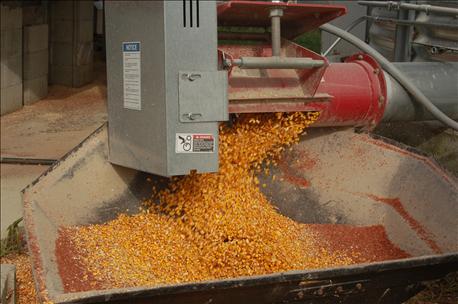
There is a family in Rush County making a plea for more training for first responders that will respond to emergencies in rural areas. For Christie Cain, her daughters, Kisha, Niki, Hillary, and her niece, Ashley Bowles, it’s personal. Their husband, father and uncle, depending on the relationship, perished in a grain bin entrapment in January.
Did the emergency response system work properly? Were knowledgeable people on the scene? Would more training have helped? Would it have saved their loved one?

TRAINING PROCEDURES: Bill Field obtained a grant four years ago to train first responders and young workers on grain bin safety and rescue efforts. Unfortunately, the money ran out recently..
Trying to answer any of those questions would involve speculation. Like most rescue efforts, it likely had its ups and downs. Some thought it took too long. Others didn’t understand why certain people were in charge instead of other people. At the end of the day, despite the efforts of everyone, all with good intentions, another farmer was lost. He could become just a statistic in records that people like Bill Field compile. Field is the Purdue University Extension safety specialist.
The Cain family is determined that Roger won’t just become a statistic. That’s why they took the brave move of agreeing to speak out about the tragedy, urging farmers to think more carefully about what they’re doing, and follow commonsense safety precautions about grain bins. They also hope that the incident will highlight the need for additional training so that should such an incident ever happen again, the odds of survival might be greater.
Field has seen all sides of this type of situation multiple times over during his career. He has consoled families, explained why first responders do have authority to take command of the scene once they arrive, like it or not. He has also mediated between fire departments and EMTs when situations became heated. The fact of the matter is, he says. Not everyone agrees on how these situations should be handled, or who should handle them. And not all local fire departments across the state cooperate with each other as fully as they could. It might be an ugly secret, but Field says it is fact.
Training piece
For his part, Field has helped develop programs that have trained over 8,000 people primarily on grain bin entrapment rescues over the past four years. Those trained include volunteer firemen, paid firemen, EMT’s, other first responders and young workers who may find themselves working in confined spaces, including grain bins.
Field was able to provide this training for modest fees and spread it across the state because of a grant from the Department of Labor, called the Susan Harwood grant. It also allowed him to search for records, and prepare reports on the numbers and trends of all kinds of entrapments in agricultural settings going back more than 50 years. It’s the kind of training that the Cain family is asking for.
Here’s the kicker. That funding ran out at the end of the year, and the program wasn’t renewed. “It’s typical for government to fund a project for four years, then fund something else,” Field says,
He’s not abandoning those in need of training. He is the master of pulling rabbits out of the hat, or at least programs out of meager budgets, and he will continue trying. The problem is he will no longer be able to provide these programs without charging for travel and some other expenses.
“It’s a matter of priorities,” Field explains. “As tragic as they are, grain bin accidents are still not the leading cause of farm fatalities by any means. If you only have so many dollars to spend on farm safety programs, you have to prioritize where it is going. It’s the logic behind why grants go where they go.”
That may be little consolation for the Cain family. Their loss is very real, and their desire to make sure no other family goes through this ordeal needlessly is very great. Perhaps someone else will step to the plate to help fund this effort. At least one family in Rush County hopes so.
About the Author(s)
You May Also Like




